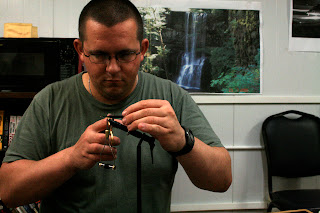And now, just two weeks later, I am sitting in a coffee shop in the island writing this blog and googling the definition of a rain shadow, one of the many charming aspects of my new home. The Olympic Rain Shadow, according to KOMO news (http://www.komonews.com/weather/faq/4306627.html), is thanks to the wall created by the Olympic Mountains, which protects the northeastern Olympic Peninsula and the San Juan Islands from the non-stop rain which torments the Pacific Northwest.
Basically, it means that I will have all the perks of a landscape with curvy Pacific Madrone and tall Douglas Firs with more sunny days.
I start this blog with an old article, I wrote during my time in Iraq, about a young man who misses the Pacific Northwest and the fishing it has to offer.
A FISHERMAN IN THE DESERT
Balad, Iraq—Inside the air-conditioned trailer, American soldiers lean against leather couches watching Brad Pitt cast a line in A River Runs Through It. Sgt. Jason Westlund’s brown eyes dreamily-gloss over as the screen flashes images of the wide river running over smooth rocks, the high grass carpets, snow-capped mountains looming in the distance and giant trout swimming through clear waters.
“The fish were breaking my heart,” says Westlund. “You can’t catch trout like that anymore.”
Westlund, 27, of Corvallis, Ore., a flight medic in C/7-158 MEDEVAC, based out of Salem, Ore., sometimes wishes he could drive out to one of his favorite fishing holes. Westlund fishes in places like the Alsea River, known for salmon and steelhead. The fifty-mile river flowing northwest of Eugene to the ocean is adorned with stone and fern covered riverbanks shaded by dense forests.
“It’s a short ride from home,” says Westlund, who often wakes at 3 am and fishes until 2 pm. Westlund also frequents the calm Odell Lake in Klamath County, Ore., where he grew up camping and fishing with his family. It’s still one of his favorite spots because “Kokanee are easy to catch and they taste good,” he says. These are places fishermen salivate for in their sleep, especially if they are stationed on a base in the middle of the desert.
Unfortunately soldiers in Iraq can’t just take off for a weekend whenever they have an urge to reel in a big one. When I ask him what he misses most about fishing trips in Oregon he says, “Everything.” He can’t quite explain how much beauty he finds there in the solitude of sunrise, of afternoons with sunlit skies over grass that sparkles like strings of emerald with the perfume of fir and pine and the cool, algae-laced lakes to wash away summer sweat. “Even if the fishing sucks, I still have a great time,” says Westlund. “All by myself in a gorgeous part of state.”
 |
| Westlund ties a fly in a trailer in Balad, Iraq. |
Solitude in Iraq is a joke. With over 100 soldiers in his company, there is rarely an empty room or silent space. Westlund spends most of his days restricted to a half-mile area, so he can hear a mission called in on a black radio strapped to his hip. That leaves him with several trailers usually bustling with other soldiers. The dining trailer is only quiet in between meals. He sits at one of the tables in the corner with his brow furrowed, fingers delicately curled and carefully moving. With a backdrop of a poster of a waterfall and lush greenery, he’s tied over a 100 flies while waiting for missions. Westlund works for hours, silently berating his creations, thinking about how “Ugly and lopsided they are coming out.” Not that there are any fat-bellied trout anywhere nearby to notice.
Every soldier has to find an escape from the heat, memories of blood-soaked helicopters and dying patients. On one of his first missions, Westlund cared for a teenage Iraqi girl with most of her body ravaged by burns, a difficult picture to erase. For Westlund keeping his hands busy is one way to de-stress.
“It makes the time go by faster,” he says.
Watching Westlund with his flies and rod in a trailer produces a certain melancholy feeling, like watching a boat stranded on a concrete driveway in winter.
No comments:
Post a Comment